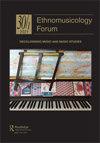《友谊地久天长》:一首歌及其文化
IF 0.2
1区 艺术学
0 MUSIC
引用次数: 1
摘要
音乐学,即使是在最负盛名的机构,也不能再假设学生们了解标准曲目。如果要教授这样的剧目,就必须在一定程度上遵循半个多世纪前的“中产阶级”教育法。问题是:为什么要麻烦?在这一点上,格思里步履蹒跚,这对一个受雇于大学的人来说有点令人惊讶她写道,“欣赏”“描述了一个获得专业理论、历史和传记知识的过程,据说这会增强对音乐的理解”(第3页)。为什么“假定”?当然,只有布迪厄的资产阶级唯美主义者才会表达这种怀疑。人们可以向本科生最详细地解释审美自主爱好者所表演的意识形态技巧;与此同时,对审美自主性的主张仍然是我们继续称之为“标准剧目”的一个不可避免的意识形态组成部分。如果文化等级制度在西方社会中仍然存在,正如格思里所建议的那样(第215-16页),那么教育工作者不仅有责任解释这些等级制度是如何获得社会支持的,还有责任解释如何与之协商。本文章由计算机程序翻译,如有差异,请以英文原文为准。
Auld Lang Syne: a song and its culture
musicology, even in the most prestigious institutions, cannot any longer assume knowledge of the standard repertory among their students. If such repertory is to be taught, this must necessarily be done somewhat along the lines of the ‘middlebrow’ pedagogy of half a century ago and more. The question is: Why bother? At this point Guthrie falters, in a manner slightly surprising for someone employed in a university. ‘Appreciation’, she writes, ‘described a process of acquiring specialist theoretical, historical, and biographical knowledge that would supposedly lead to enhanced musical understanding’ (p. 3). Why ‘supposedly’? Surely it is only Bourdieu’s bourgeois aesthete who would express such scepticism. One can explain to undergraduates in the greatest detail the ideological sleights of hand performed by devotees of aesthetic autonomy; at the same time, a claim to aesthetic autonomy remains an inescapable ideological component of ‘the standard repertory’, as we continue to call it. If cultural hierarchies still exist in Western societies, as Guthrie suggests (pp. 215–16), then educators have a duty not just to explain how these hierarchies find their social support, but also how to negotiate them.
求助全文
通过发布文献求助,成功后即可免费获取论文全文。
去求助
来源期刊

Ethnomusicology Forum
MUSIC-
CiteScore
1.10
自引率
25.00%
发文量
29
期刊介绍:
Articles often emphasise first-hand, sustained engagement with people as music makers, taking the form of ethnographic writing following one or more periods of fieldwork. Typically, ethnographies aim for a broad assessment of the processes and contexts through and within which music is imagined, discussed and made. Ethnography may be synthesised with a variety of analytical, historical and other methodologies, often entering into dialogue with other disciplinary areas such as music psychology, music education, historical musicology, performance studies, critical theory, dance, folklore and linguistics. The field is therefore characterised by its breadth in theory and method, its interdisciplinary nature and its global perspective.
 求助内容:
求助内容: 应助结果提醒方式:
应助结果提醒方式:


